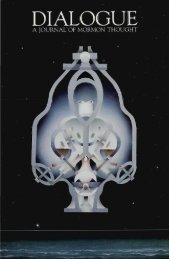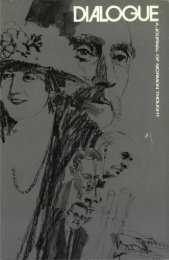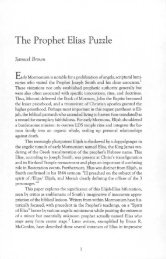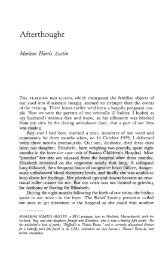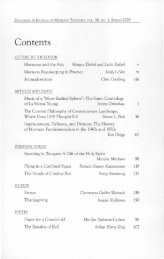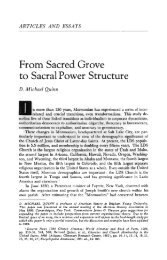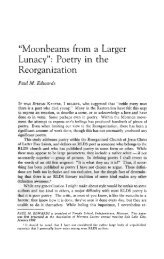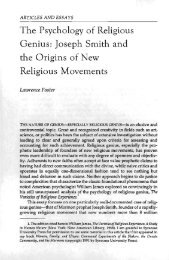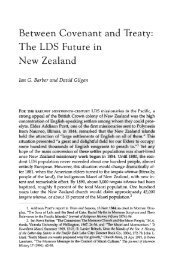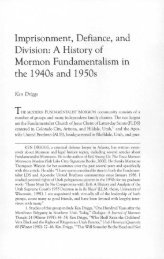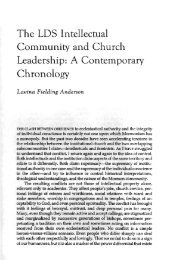Dialogue, Volume 25, Number 2 - Dialogue – A Journal of Mormon ...
Dialogue, Volume 25, Number 2 - Dialogue – A Journal of Mormon ...
Dialogue, Volume 25, Number 2 - Dialogue – A Journal of Mormon ...
You also want an ePaper? Increase the reach of your titles
YUMPU automatically turns print PDFs into web optimized ePapers that Google loves.
122 DIALOGUE: A JOURNAL OF MORMON THOUGHT<br />
We're just knocked out.<br />
We heard about the sell-out.<br />
You gotta get an album out,<br />
You owe it to the people.<br />
We're so happy we can hardly count.<br />
And did we tell you the name <strong>of</strong> the game, boy,<br />
We call it Riding the Gravy Train.<br />
Songs like these made me cynical about anyone who wore a suit<br />
and tie and represented the business world.<br />
By the time I was eighteen, I <strong>of</strong>ten talked with my friends about<br />
the evils <strong>of</strong> commercial music aimed at the lowest common denominator<br />
<strong>of</strong> intelligence. My attitude may have been narrow, but it was what<br />
I believed: If it's on the radio —don't listen to it! I had a vision <strong>of</strong> what<br />
rock-n-roll should be like. I believed in what I thought was "art for<br />
art's sake," that a musician's personal voice should never be restricted<br />
for commercial advantage or to fit some kind <strong>of</strong> model, and that even<br />
"established" musicians had to guard against stagnation within their<br />
own niche.<br />
I realize now why I admired certain rock groups so much: they'd<br />
found an art form that was true to their lifestyle. The sound <strong>of</strong> their<br />
music, the way they dressed, and their personal values all created a<br />
consistent expression. While I didn't always agree with their standards<br />
<strong>of</strong> morality, I could see that their music had a kind <strong>of</strong> integrity. It was<br />
true to itself.<br />
When I was nineteen, I moved to Vernal, Utah, where my sister's<br />
family lived. Work in the oil fields there was plentiful, and I wanted to<br />
get out on my own. Again I started a band. In time I came in contact<br />
with the Church <strong>of</strong> Jesus Christ <strong>of</strong> Latter-day Saints in Vernal, and I<br />
was baptized two weeks after my twenty-first birthday. After that I<br />
played with my band at a few parties, but I began to feel out <strong>of</strong> place<br />
performing at beer parties and bars. It was especially difficult for me<br />
to change my old habits while working with people who were drinking,<br />
smoking, and using drugs. Finally I quit the band and prepared<br />
to go on a mission.<br />
As a new convert to the Church, I was full <strong>of</strong> enthusiasm. I read<br />
every book on <strong>Mormon</strong> doctrine I could find time for. My desire for<br />
knowledge about life and the gospel was very strong, but I faced a<br />
dilemma: how to appropriately express my new feelings about the<br />
gospel and my new perspective on life. At first I wondered if I should<br />
give up the guitar altogether. A well-meaning older man, whose<br />
family had fellowshipped me during my first months in the Church,<br />
nearly convinced me that any music with a drumbeat was immoral. I



